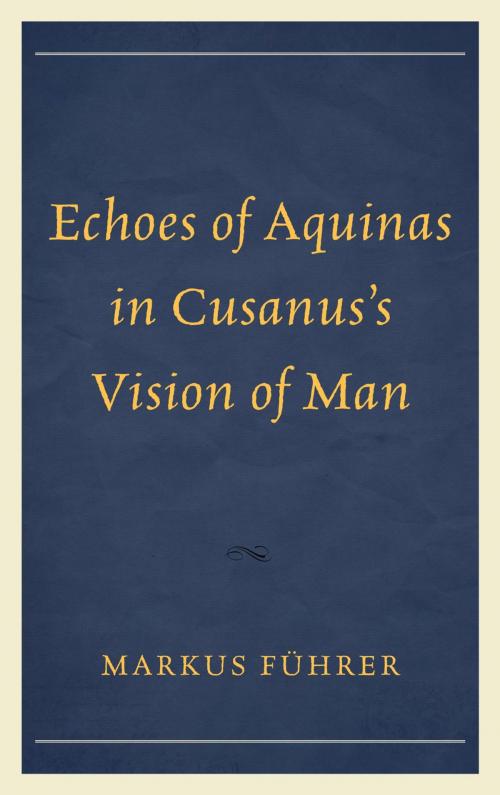Echoes of Aquinas in Cusanus's Vision of Man
Nonfiction, History, Renaissance, Religion & Spirituality, Philosophy, Religious, Medieval| Author: | Markus Führer | ISBN: | 9780739187418 |
| Publisher: | Lexington Books | Publication: | February 19, 2014 |
| Imprint: | Lexington Books | Language: | English |
| Author: | Markus Führer |
| ISBN: | 9780739187418 |
| Publisher: | Lexington Books |
| Publication: | February 19, 2014 |
| Imprint: | Lexington Books |
| Language: | English |
Echoes of Aquinas in Cusanus’s Vision of Man demonstrates the influence that the philosophical and theological anthropology of Saint Thomas Aquinas had on Nicholas of Cusa’s (Cusanus) view of human nature. Markus Führer demonstrates that Cusanus's view of the place of man in the universe is remarkably similar to the view of Aquinas. Führer thereby challenges the prevailing opinion that Cusanus was a Renaissance philosopher dedicated to the philosophy of man and that he was one of the founders of Renaissance humanism. A close examination of the texts of both Aquinas and Cusanus, when compared to some of the leading Renaissance writers, indicates that it is not entirely true that Cusanus was Renaissance in his analysis of the human condition. Because Cusanus’s copies of some of the works of Aquinas are still intact and his marginal comments in these manuscripts indicate not only that he read Aquinas carefully, but also actually reacted to texts in Aquinas, it is possible to conduct a study of Cusanus’s use of Aquinas based directly on the text of Aquinas. Führer also explores similarities by studying the formulae that both writers used in expressing their respective positions. This book, with its unique examination of the impact of Aquinas’s thought upon Cusanus, will appeal to students and scholars of late medieval theology and philosophy.
Echoes of Aquinas in Cusanus’s Vision of Man demonstrates the influence that the philosophical and theological anthropology of Saint Thomas Aquinas had on Nicholas of Cusa’s (Cusanus) view of human nature. Markus Führer demonstrates that Cusanus's view of the place of man in the universe is remarkably similar to the view of Aquinas. Führer thereby challenges the prevailing opinion that Cusanus was a Renaissance philosopher dedicated to the philosophy of man and that he was one of the founders of Renaissance humanism. A close examination of the texts of both Aquinas and Cusanus, when compared to some of the leading Renaissance writers, indicates that it is not entirely true that Cusanus was Renaissance in his analysis of the human condition. Because Cusanus’s copies of some of the works of Aquinas are still intact and his marginal comments in these manuscripts indicate not only that he read Aquinas carefully, but also actually reacted to texts in Aquinas, it is possible to conduct a study of Cusanus’s use of Aquinas based directly on the text of Aquinas. Führer also explores similarities by studying the formulae that both writers used in expressing their respective positions. This book, with its unique examination of the impact of Aquinas’s thought upon Cusanus, will appeal to students and scholars of late medieval theology and philosophy.















